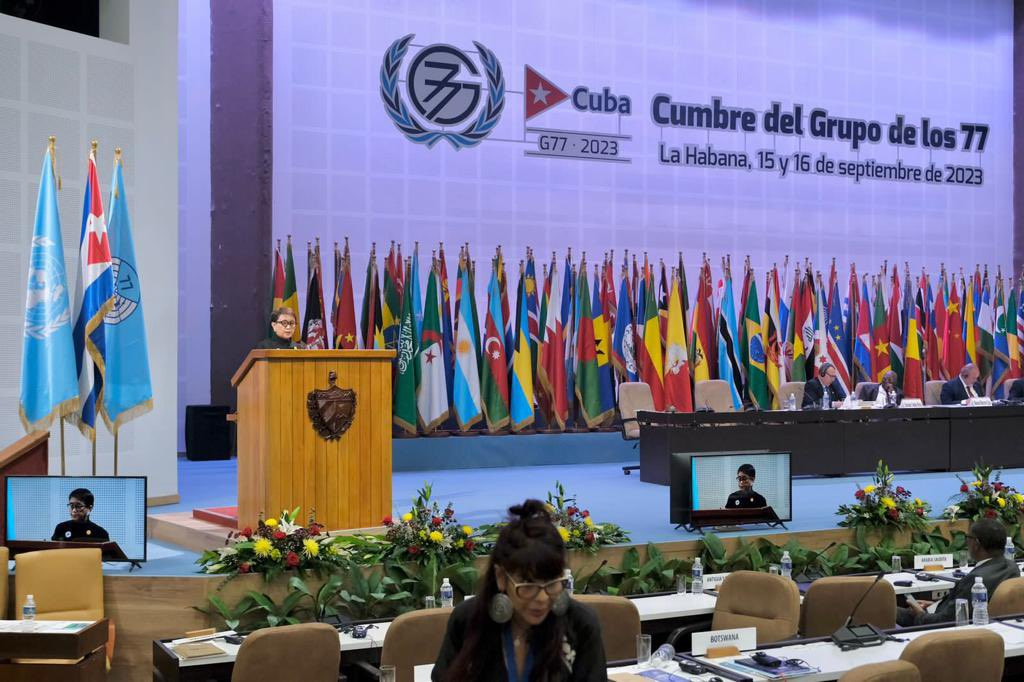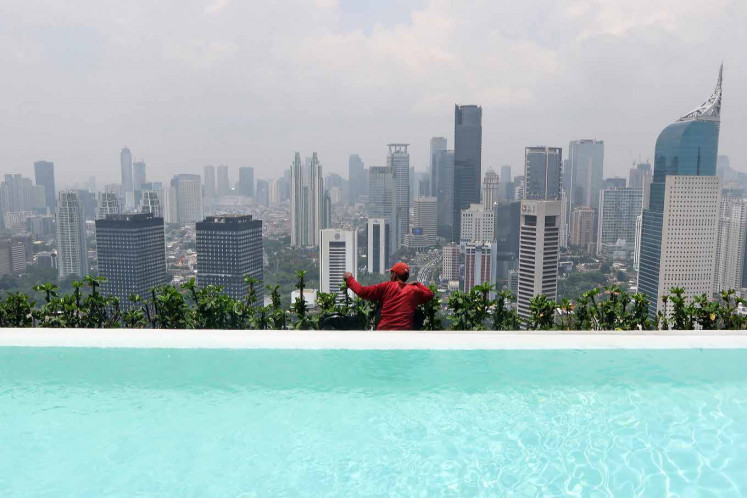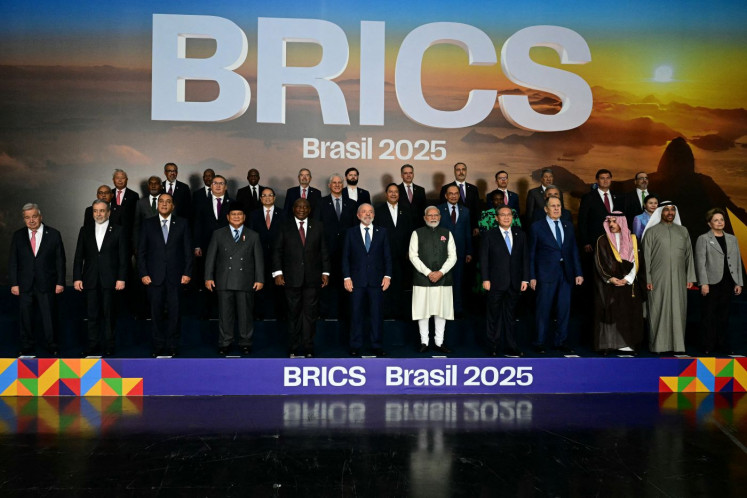Popular Reads
Top Results
Can't find what you're looking for?
View all search resultsPopular Reads
Top Results
Can't find what you're looking for?
View all search resultsReviving Bandung 1955 spirit: G77 journey to equitable South
Indonesia and other developing countries should be able to implement their industrialization policies by downstreaming their critical mineral and extractive resource industries to added-value products.
Change text size
Gift Premium Articles
to Anyone
E
conomic diplomacy plays a vital role in the development, stability and global influence of countries, particularly those in the Global South.
Many developing countries are eager to improve their economic diplomacy by leveraging economic resources and opportunities on the international stage. In many cases, building a strong platform for shared economic interests will remain a pivotal instrument for foreign policy.
Indonesia has cemented this important instrument under President Joko “Jokowi” Widodo’s foreign policy agenda. Earlier this month, Indonesia successfully held the ASEAN Summit 2023, which underlined ASEAN's important role as the epicentrum of growth.
Indonesia's preeminent role as a driver of cooperation and a bridge-builder between countries is increasingly evident and has been showcased by President Jokowi and the Foreign Ministry at other important global summits, namely the Group of Seven, BRICS and Group of 20 summits.
However, another summit that should not be overlooked is the Group of 77 and China summit, which took place in Havana from Sept. 15 to 16.
The G77 is an important platform for developing countries to harmonize their views on global issues and determine a common position for multilateral negotiation strategies. It also aims to amplify the voice of the Global South and solidify the unity of the developing countries in shaping global governance.
This group was established in Geneva in 1964 when 77 developing countries made a joint declaration on the sidelines of a meeting of the United Nations Conference on Trade and Development (UNCTAD).
The Bandung Conference (Asian-African Conference) in 1955 laid the foundation of cooperation between developing countries and served as an important groundwork for the establishment of the G77. Therefore, it is not surprising that both Indonesia and China play active roles in the G77.
Indonesia has remained active in voicing important concerns for developing countries, such as South-South cooperation, maintaining peace and security and promoting sustainable development and economic growth.
The latest UN Secretary-General Sustainable Development Goals (SDGs) Progress Report 2023 shows that progress on the 50 percent SDG target is insufficient and weak. The world has stalled and even backtracked on more than 30 percent of the SDGs. Under current trends, only about one third of countries will meet the target of halving poverty levels by 2030, and 600 million people will still be facing hunger, especially in developing countries.
This number illustrates how developing countries are asymmetrically impacted by the consequences of the inefficacy of collective efforts on development, and, to make matters worse, new and unprecedented global challenges continue to evolve.
These challenges highlight the need for developing countries to collaborate so that their collective voice will be stronger and achieve more impact.
The G77 and China, which represent 80 percent of the world’s population and two thirds of UN member countries, is a platform that serves this objective, especially in the increasingly fragmented world we are living in today.
The relevance and visibility of the G77 and China are important but require revitalization and recalibration. Indonesia could play a leadership role in this process. The G77 has a broad scope, but an important issue to focus on when revitalizing is trade and development, which happens to be the driving concern behind the birth of the G77 in Geneva.
Given the current geopolitical tension and worldwide lack of trust, the spirit of nonalignment, solidarity among developing countries and equality that was established at the Bandung Declaration is a stark reminder that developing countries can enhance their unity and collaboration by using the G77 and China platform to promote economic development.
In this regard, there are three things that the G77 and China could push for to enhance improve cooperation.
First, strengthening multilateralism.
The current multilateral trading system has considerably reduced trade tariffs, but there is an increase in non-tariff measures as a form of protectionism for developing country exports. A better spirit of collaboration among developing countries is needed to push the implementation of a fair and rules-based multilateral trade system centered around development.
The harmonization of trade policies and standards in developing countries can increase market access, raise opportunities for business production and has the potential to increase income and job availability in developing countries.
Second, propagating the importance of policy space for developing countries in the trade and development sector.
In 1955, the Bandung Conference allowed newly independent countries to lead development based on their national interests. This spirit could be manifested in the current context, with developing countries controlling their own development projects rather than simply responding to the wishes of development partners.
Indonesia and other developing countries should be able to implement their industrialization policies by downstreaming their critical mineral and extractive resource industries to added-value products.
Going beyond the simple export of raw materials is a clear pathway for developing countries to receive their fair share of the wealth that is generated by their economic development.
Third, mobilizing finance, trade and investment for sustainable development.
According to the UNCTAD’s World Investment Report in 2023, developing countries are facing a US$2.2 trillion annual financing gap for energy transitions. This requires enhanced cooperation in mobilizing financial resources.
Innovative and transformative resource mobilization involving all stakeholders, including South-South cooperation, is an important element in this objective. Indonesia has been active in establishing investment collaborations with other developing countries, including through President Jokowi’s recent visit to some African nations.
These issues should be central to the G77 and China as the group consolidates its position and raises its voice to exert influence in shaping global governance.
Indonesia will continue to work together with other developing countries, including through UNCTAD in Geneva. In its current role as vice president of the governing body of UNCTAD, Indonesia has completed several initiatives through the G77, including, together with ASEAN, initiating a proposal to revitalize the G77 and China to ensure its cohesiveness and effective visibility in voicing the aspirations of the global south.
If the Bandung spirit allowed Indonesia to bring the post-colonial world together in the name of unity and solidarity at the Asia-Africa Conference, it is time for Indonesia to step up in elevating the relevance and visibility of the G77 and China in the years to come. The developing world can become stronger in realizing a better future.
The spirit of Bandung in 1955 is still relevant and should be strengthened toward the 60th anniversary of UNCTAD and the group of G77 and China next year, as well as the 70th anniversary of the Bandung Conference in 2025.
***
The writer is the Indonesian ambassador/permanent representative to the United Nations, World Trade Organization and other international organizations in Geneva











